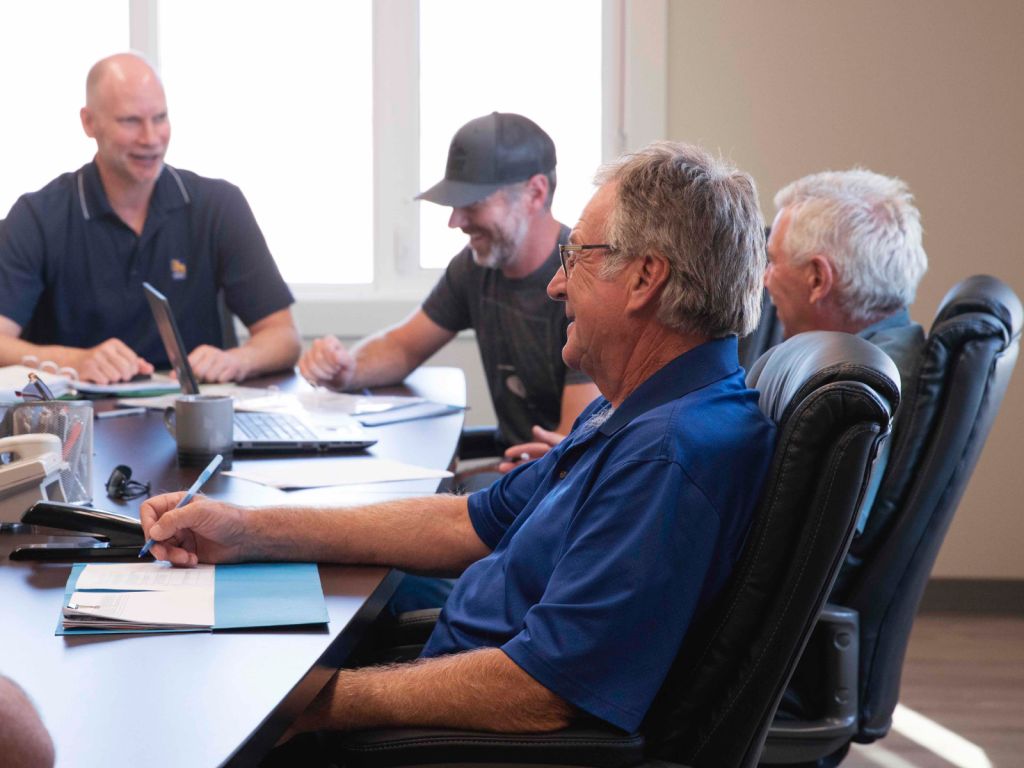Published September 14, 2023 • 8 Min Read
A franchise is a business model that allows owners to sell goods and services under an established brand as part of a franchise agreement. While many think of the “golden arches” franchise, there are many sectors where you can invest in a franchise to make your entrepreneurship ideas happen.
In this webinar, host Christine Suski, Director, Small Business at RBC, is joined by RBC franchising expert Joanne Mason and successful franchisors Andy and Priya Gogia, proud owners of Twisted Indian Fusion Street Food.
Catch an on-demand recording:
Starting a franchise
Andy and Priya Gogia bought their first Subway franchise in 2003. Both had extensive experience in the food industry and wanted to use their knowledge in an entrepreneurial way. Following considerable success at Subway, as well as a Mexican quick-service chain, they decided to launch Twisted Indian Fusion Street Food (then called Twisted Indian Wraps) in 2013 with an aim of bringing healthy, approachable and delicious Indian food to the Canadian population. Read about their full story here.
As successful franchisees and franchise owners, Andy and Priya have a great deal to share with those thinking about starting a franchise. Here are their top tips:
-
Do what you’re passionate about. “Without passion, you can’t drive a business or represent that business. You need to wear that business on your shoulders, on your sleeve and be proud to represent the brand,” says Andy, adding that it’s important to develop an affinity towards a specific brand and nurture your passion for it.
-
Match your perception with reality. Priya explains that many prospective franchise owners have an idea of what it’s like to run a franchise – but their perception differs greatly from reality. “Make sure you get experience before you jump in,” she says. For example, if you’re thinking of owning a quick-service restaurant, go work at a QSR establishment to understand what it’s like.
-
Understand why. Why do you want to go into franchising? “You really need to know your ‘why’ and understand the lifestyle,” cautions Priya.
-
Know your financial position. “It’s crucial that you know how much cash you have available and how much it would cost to buy a franchise.”
On financials, Joanne adds that there are intricacies to examine and get comfortable with. “Franchise banners have different requirements,” she says. “Some banners need you to put a minimum equity injection, which is your personal cash flow, into a location or project. Understand what that is, what you will need to start with the business and understand the fees.” As there are franchise fees and royalty fees involved, it’s important to have a really solid handle on what is expected of you as a franchisee. Contacting a lawyer and accountant is a smart idea at the early stage, so you can go into any discussions prepared and set up for success.
At the same time, Joanne urges prospective franchise owners to avoid overextending themselves. ‘You don’t want to put all your money into the business,” she says, citing the potential for unforeseen circumstances (i.e., COVID). “You need to be able to sustain your business during a time where there are unknowns or a decrease in sales.”
Read RBC’s A Guide to Buying a Franchise — a helpful e-guide for prospective franchisees – for further information.
Growing a franchise
When you own a franchise, growth can happen in a couple of ways. You can grow your customer base at your current location, and you can expand your ownership to additional locations. The panellists offer this advice for growing a franchise.
-
Engage in your community. While franchisors will do national-level marketing to advertise the brand, individual locations should engage in local store marketing or LSM. This involves advertising in a local newspaper, sponsoring a local hockey team or doing charity events. “As a franchisee, you’re going to have more success when you are community-driven,” says Andy. “Involvement in your community helps you get your name out and will lead to success.”
-
Always watch your profitability levels. With the current economic climate, prices for goods have fluctuated considerably, and food costs have consistently gone up over the past year. As owners of a fast-casual restaurant, Andy and Priya are always looking for ways to reduce their costs without compromising quality. “We have weekly meetings with our food supplier and are always working on ways to reduce our costs while maintaining quality. To be successful, we have to have lower operating costs and increase profitability,” says Priya.
-
Always watch your profitability levels. With the current economic climate, prices for goods have fluctuated considerably, and food costs have consistently gone up over the past year. As owners of a fast-casual restaurant, Andy and Priya are always looking for ways to reduce their costs without compromising quality. “We have weekly meetings with our food supplier and are always working on ways to reduce our costs while maintaining quality. To be successful, we have to have lower operating costs and increase profitability,” says Priya.
-
Multiply. “Franchising is a numbers game,” says Priya. “You can’t become rich in one store — you have to multiply. The fun in franchising is when you are a multi-unit owner and can free yourself from your original store and put a team in place to run it.”
Joanne adds that as you’re looking to grow a franchise, it’s smart to leverage the resources that are available to franchisees. “Do your research — there are so many avenues that you can refer to, such as the Canadian Franchise Association (CFA).” Franchise Canada Online, produced by the CFA, is a comprehensive resource for franchisees that offers resources on every step of the franchising process.
Becoming franchisors
Twisted Indian Fusion Street Food has 12 locations, and they have recently completed an 18-store deal in British Columbia. From being owners of a single Subway franchise, they expanded to multiple locations under that banner and replicated their success with the Mexican chain. As they run Twisted Indian, they explain that they have franchise ownership down to a science and have insightful tips for those looking to expand a franchise.
-
Have your systems in place. “You need to ensure that when you move your concept to locations two, three and four, you’re able to multiply it and maintain consistency. Once you have achieved the recipe, you can grow,” says Priya.
-
Be selective in who you bring on board. When it comes to finding potential franchisees, Andy and Priya look for certain qualities. Communication skills, passion and personality are all crucial. “Are they a people-person? Do they work well with teams in a team environment? Are they outgoing?” says Priya. She also adds that they appreciate candidates who are bringing their own cash to the table rather than it being a gift or an inheritance. “If they’ve been able to save on their own, they know the value of money,” she says.
-
Get legal support. Engage a Lawyer to review the Franchise Disclosure Document and Franchise Agreement presented to you by the Franchisor.
-
Bring in outside experts. Andy and Priya brought in a business development consultant last year, who completes store audits, runs through checklists and ensures key points are being met, such as food quality, clean environment, good ambiance, friendly service, etc.
-
Find local partnerships. As Andy and Priya are expanding into BC (they started in Ontario), they partnered with an Area Representative. “They understand the lay of the land, the geography, the economics and how the locations may or may not work,” says Priya.
5 key takeaways
So, what’s the bottom line on franchising? Here are five key takeaways from the webinar’s panellists.
-
“Today there are more than 65,000 franchise units in Canada, employing approximately 2 million Canadians.” — Christine Suski
-
“As a franchisee, you’re going to have more success when you are community-driven. Involvement in your community helps you get your name out and will lead to success.” — Andy Gogia
-
“Perception and reality are two different things. Make sure you get experience before you jump in. If you’re thinking of owning a quick service restaurant, go work at a QSR establishment to make sure it’s something you would really like to do.” — Priya Gogia
-
“You’re going to be married to the business, and there are a lot of hours that go into it, especially at the startup period when you’re building it. You need to be passionate about the business and choose a banner or a franchise that is in line with your values and your lifestyle.” — Joanne Mason
-
“Franchising is a numbers game. You can’t become rich in one store – you have to multiply. The fun in franchising is when you are a multi-unit owner and can free yourself from your original store and put a team in place to run it.” — Priya Gogia
Still wondering if owning a franchise is right for you? Take a look at our article, Is Owning a Franchise Right For You? 7 Things to Consider, for additional insights.
You can also use our free Franchise Assessment Tool, which can help you evaluate franchise systems and understand what questions to ask as you assess your options and determine if becoming a franchise owner is the right fit.
* Source: CFA Canadian Franchise Industry Economic
Outlook 2023 (April 2023 publication).
Canadian Franchising: A 2023 Industry Overview
This article is intended as general information only and is not to be relied upon as constituting legal, financial or other professional advice. A professional advisor should be consulted regarding your specific situation. Information presented is believed to be factual and up-to-date but we do not guarantee its accuracy and it should not be regarded as a complete analysis of the subjects discussed. All expressions of opinion reflect the judgment of the authors as of the date of publication and are subject to change. No endorsement of any third parties or their advice, opinions, information, products or services is expressly given or implied by Royal Bank of Canada or any of its affiliates.
Share This Article






